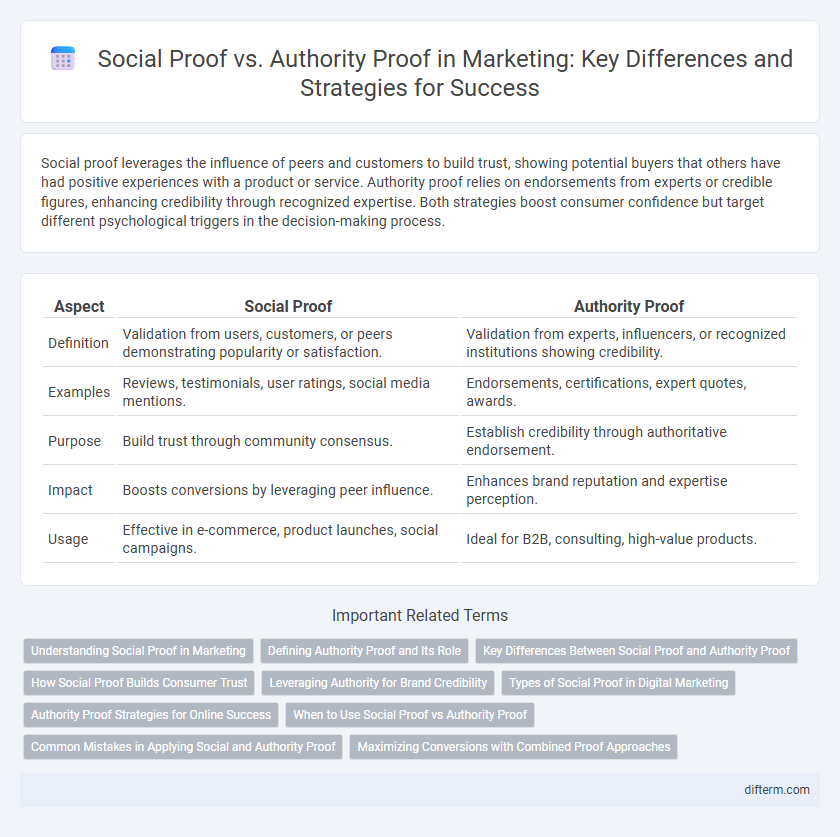Social proof leverages the influence of peers and customers to build trust, showing potential buyers that others have had positive experiences with a product or service. Authority proof relies on endorsements from experts or credible figures, enhancing credibility through recognized expertise. Both strategies boost consumer confidence but target different psychological triggers in the decision-making process.
Table of Comparison
| Aspect | Social Proof | Authority Proof |
|---|---|---|
| Definition | Validation from users, customers, or peers demonstrating popularity or satisfaction. | Validation from experts, influencers, or recognized institutions showing credibility. |
| Examples | Reviews, testimonials, user ratings, social media mentions. | Endorsements, certifications, expert quotes, awards. |
| Purpose | Build trust through community consensus. | Establish credibility through authoritative endorsement. |
| Impact | Boosts conversions by leveraging peer influence. | Enhances brand reputation and expertise perception. |
| Usage | Effective in e-commerce, product launches, social campaigns. | Ideal for B2B, consulting, high-value products. |
Understanding Social Proof in Marketing
Social proof in marketing leverages consumer behavior by showcasing testimonials, reviews, and user-generated content to build trust and influence purchasing decisions. It capitalizes on the psychological principle that people tend to follow the actions and choices of others, especially in uncertain situations. Brands that effectively implement social proof strategies see increased conversion rates and enhanced customer loyalty.
Defining Authority Proof and Its Role
Authority proof in marketing establishes credibility by showcasing endorsements from recognized experts, industry leaders, or official certifications, thereby enhancing consumer trust and persuasion. Unlike general social proof, authority proof leverages authoritative sources that signify expertise and reliability, significantly influencing purchase decisions and brand reputation. Implementing authority proof can manifest through expert testimonials, professional affiliations, or verified credentials, effectively reducing buyer skepticism and increasing conversion rates.
Key Differences Between Social Proof and Authority Proof
Social proof relies on the influence of peers and user-generated content such as reviews, testimonials, and ratings to build trust and credibility. Authority proof leverages endorsements, expertise, or credentials from recognized experts or institutions to establish legitimacy and expert validation. While social proof emphasizes community consensus, authority proof focuses on authoritative validation to persuade potential customers.
How Social Proof Builds Consumer Trust
Social proof builds consumer trust by showcasing real user experiences, ratings, and testimonials that validate a product's value through peer influence. Unlike authority proof, which relies on endorsements from experts or brands, social proof leverages the collective behavior of everyday consumers to create a sense of reliability and authenticity. This dynamic increases conversion rates by reducing perceived risk and encouraging potential buyers to follow the actions of others.
Leveraging Authority for Brand Credibility
Leveraging authority proof enhances brand credibility by highlighting endorsements from recognized experts, industry leaders, or reputable organizations, which strongly influences consumer trust and decision-making. Unlike social proof that relies on peer validation such as user reviews or testimonials, authority proof establishes a brand's expertise and legitimacy through official recognition or authoritative endorsements. Integrating authority proof in marketing strategies strengthens brand reputation, drives customer confidence, and supports higher conversion rates.
Types of Social Proof in Digital Marketing
Types of social proof in digital marketing include user-generated content, customer reviews, influencer endorsements, social media mentions, and case studies. These elements build trust by showing potential customers real interactions and feedback from others, enhancing credibility beyond brand claims. Leveraging these types improves conversion rates by tapping into the psychological principle of validation through peer influence.
Authority Proof Strategies for Online Success
Authority proof strategies leverage expert endorsements, certifications, and influencer partnerships to build trust and credibility in online marketing. Displaying qualifications, awards, or case studies from recognized industry leaders enhances perceived expertise, driving higher conversion rates. Integrating authoritative content and verified testimonials strengthens brand reputation, establishing dominance in competitive digital landscapes.
When to Use Social Proof vs Authority Proof
Social proof is most effective when targeting undecided customers who rely on peer validation through reviews, testimonials, or user-generated content to build trust. Authority proof works best in industries where expertise, certifications, or endorsements from recognized figures establish credibility and influence decisions. Marketers should leverage social proof in mass-market campaigns and authority proof in niche or professional markets for optimal conversion.
Common Mistakes in Applying Social and Authority Proof
Confusing social proof with authority proof often leads marketers to misuse testimonials from peers instead of endorsements from recognized experts, diluting message credibility. Overreliance on quantity over quality in social proof can cause skepticism, as consumers prioritize genuine, relevant experiences over sheer volume. Neglecting to align authority proof with the target audience's values and expectations results in ineffective persuasion and reduced conversion rates.
Maximizing Conversions with Combined Proof Approaches
Maximizing conversions requires leveraging both social proof and authority proof to build trust and credibility effectively. Social proof highlights customer testimonials, reviews, and user-generated content that demonstrate real-world satisfaction, while authority proof emphasizes endorsements from experts, certifications, and industry recognitions. Integrating these proof types creates a compelling narrative that reduces buyer hesitation and significantly increases the likelihood of conversion.
Social proof vs authority proof Infographic

 difterm.com
difterm.com